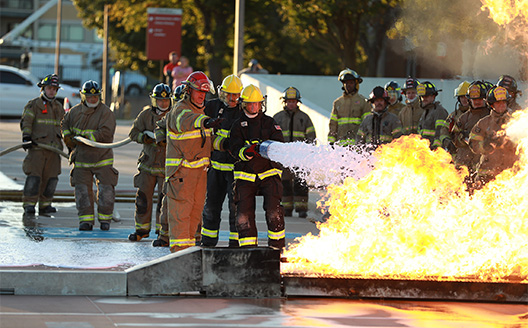Fulfilling a Burning Need
May 5, 2022

If you have a fire emergency, you call 9-1-1. But what if nobody is available?
That is the sad truth facing fire departments across America. Currently, the City of Tulsa estimated it is down about 70 firefighters from the average number on staff. In other communities like Bixby, the need is also there. Tulsa Tech and Oklahoma State University teamed up to help put on an accelerated fire academy. OSU is the only site in the state to be accredited through the International Fire Service Accreditation Congress. The nine-week program covers all the training areas needed for firefighter certification and costs significantly less than it usually would, because it cuts down on travel.
“It’s a huge savings when you look at travel, food, hotels, the timeline, and overtime budgets,” Bixby Fire Chief Joey Wiedel said. “There’s a lot of factors that this has taken off of the table that made this very appealing.”
One of the recruits is Mitchell Moore. “My uncle was a firefighter, so that is what made me want to do this,” Moore said with a grin. “Getting hired at Bixby fire allowed me to take part in this fire academy.”
Students in the academy take everything from basic firefighting skills to advanced fire behavior, standpipe operations, and air management. Moore is a trained paramedic but came into the academy without any fire training.
“Having zero fire experience and coming in as a paramedic, I had never put on PPE,” Moore said. “Within the first week, we’re getting it on in under 30 seconds and are ready to run into a building.”
He added the academy gave him effective intelligence to use the skills in the real world when the textbook no longer applies. Nationwide the need for firefighters is just as strong. The U.S. Bureau of Labor Statistics shows the need for firefighters will grow nearly eight percent over the next decade. That is what makes the academy so critical.
“Fire chiefs around the area are telling us firemen are retiring,” Dr. Matt Litterell, Director of Business and Industry Services at Tulsa Tech, said. “We expect there to be a hiring bubble, so there will probably have to be more training for the next few years, then potentially taper off after the hiring waves subside.”
The training is part of the customized curriculum the Business and Industry Services department provides to employers throughout the region. This cooperative agreement between Tulsa Tech, Oklahoma State, and local fire departments means recruits can get the training to start keeping you safe.
“We have had 14 hour days,” Moore stated. “Most of the time, they are 10 hour days Monday through Friday. The training includes classes on how to talk to elementary students about fire safety.”
As for cadet Moore, the time in this accelerated academy has been a unique and tiring experience, but one he thinks will serve him well going forward.
“I have talked to guys at my department, and they take one class in November and then the next a few months later,” Moore said. “We did it in the same month, and that is a huge help. You can not get better training in this short time than what Tulsa Tech is offering.”